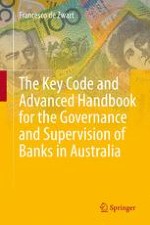2022 | OriginalPaper | Chapter
33. Financial and Bank-Specific Expertise
Author : Francesco de Zwart
Published in: The Key Code and Advanced Handbook for the Governance and Supervision of Banks in Australia
Publisher: Springer Nature Singapore
Activate our intelligent search to find suitable subject content or patents.
Select sections of text to find matching patents with Artificial Intelligence. powered by
Select sections of text to find additional relevant content using AI-assisted search. powered by
